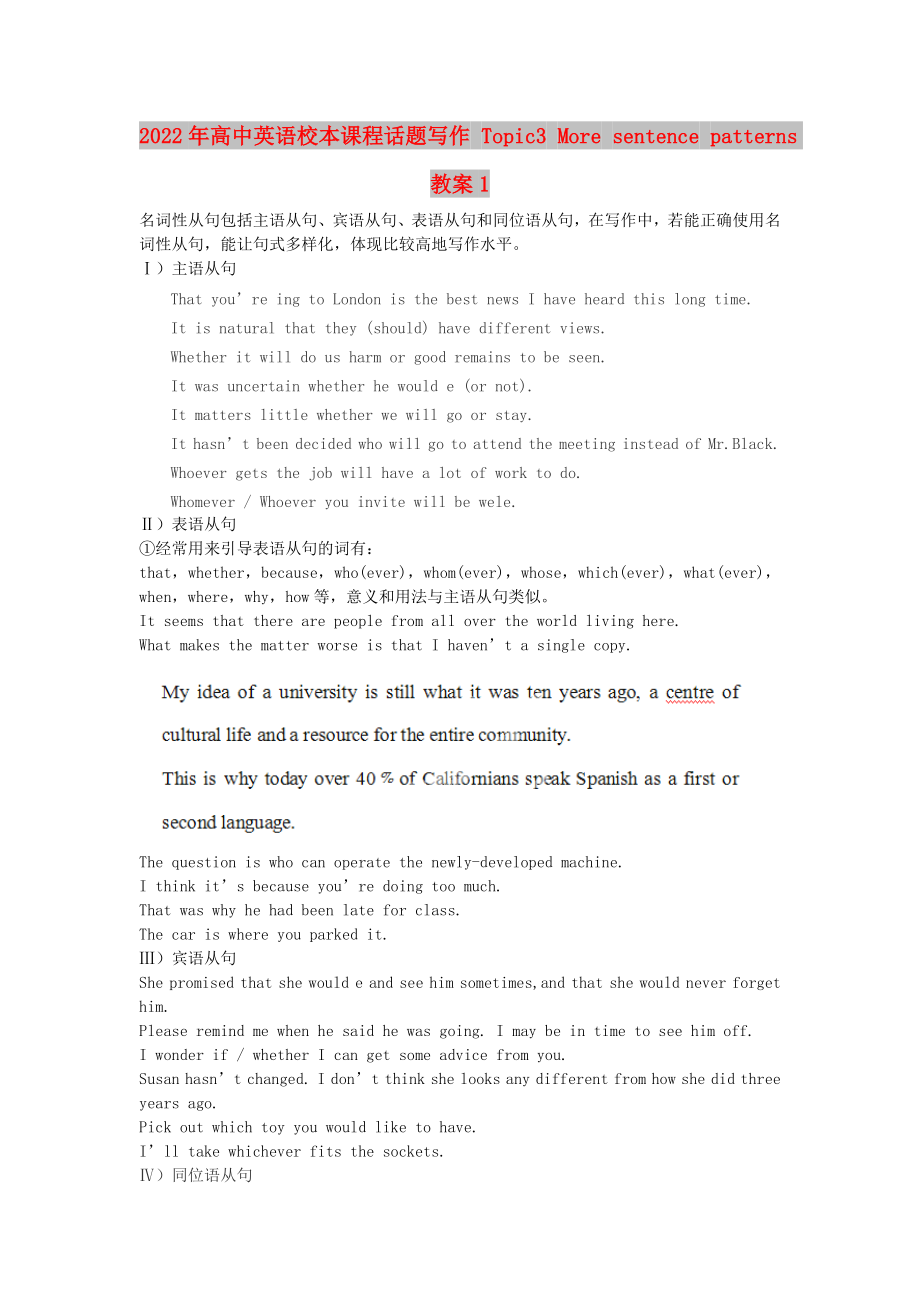《2022年高中英語(yǔ)校本課程話題寫(xiě)作 Topic3 More sentence patterns教案1》由會(huì)員分享���,可在線閱讀����,更多相關(guān)《2022年高中英語(yǔ)校本課程話題寫(xiě)作 Topic3 More sentence patterns教案1(3頁(yè)珍藏版)》請(qǐng)?jiān)谘b配圖網(wǎng)上搜索����。
1、2022年高中英語(yǔ)校本課程話題寫(xiě)作 Topic3 More sentence patterns教案1
名詞性從句包括主語(yǔ)從句�����、賓語(yǔ)從句���、表語(yǔ)從句和同位語(yǔ)從句�����,在寫(xiě)作中���,若能正確使用名詞性從句��,能讓句式多樣化��,體現(xiàn)比較高地寫(xiě)作水平�。
Ⅰ)主語(yǔ)從句
That you’re ing to London is the best news I have heard this long time.
It is natural that they (should) have different views.
Whether it will do us harm or good remains to
2�、 be seen.
It was uncertain whether he would e (or not).
It matters little whether we will go or stay.
It hasn’t been decided who will go to attend the meeting instead of Mr.Black.
Whoever gets the job will have a lot of work to do.
Whomever / Whoever you invite will be wele.
Ⅱ)表語(yǔ)從句
①經(jīng)常用來(lái)引導(dǎo)表語(yǔ)從
3����、句的詞有:
that,whether���,because����,who(ever)�����,whom(ever)���,whose�,which(ever),what(ever)�����,when�����,where���,why,how等,意義和用法與主語(yǔ)從句類似。
It seems that there are people from all over the world living here.
What makes the matter worse is that I haven’t a single copy.
The question is who can operate the newly-developed mach
4���、ine.
I think it’s because you’re doing too much.
That was why he had been late for class.
The car is where you parked it.
Ⅲ)賓語(yǔ)從句
She promised that she would e and see him sometimes,and that she would never forget him.
Please remind me when he said he was going. I may be in time to see him off.
5���、
I wonder if / whether I can get some advice from you.
Susan hasn’t changed. I don’t think she looks any different from how she did three years ago.
Pick out which toy you would like to have.
I’ll take whichever fits the sockets.
Ⅳ)同位語(yǔ)從句
I don not know the fact that he stole a horse from the f
6、arm.
We expressed the hope that they would e and visit China again.
The news that we are having a holiday tomorrow is not true.
The idea that you can do this work well without thinking is quite wrong.
The difficulty lies in the fact that we have no money.
在英語(yǔ)中非謂語(yǔ)動(dòng)詞用法相當(dāng)活躍�,正確使用非謂語(yǔ)動(dòng)詞可以讓文章增色不少,以或得高
7、分。
你讓機(jī)器一直開(kāi)著是不對(duì)的�。(主動(dòng)���,正在進(jìn)行)
The guests left most of the dishes untouched, because they didn’t taste delicious.
客人們沒(méi)有動(dòng)大部分菜��,因?yàn)樗鼈儑L起來(lái)不可口�����。(被動(dòng)��,完成)
He left, leaving me to do all the rest work.
他走了�����,留下我一人去做剩余的工所有工作����。(主動(dòng)�,將來(lái))
We hurriedly ended our meeting, leaving many problems to be settled.
我們匆匆忙忙地結(jié)束了
8�、會(huì)議,留下了很多問(wèn)題等待解決。(被動(dòng)�,將來(lái))
3.have, get 后接三種形式作賓補(bǔ)時(shí),其中have, get 表示“使���、讓���、叫”之意。
① have sth. done = get sth. done “使/讓某事由別人去做”(叫/讓某人做某事)�。如
I’ll have /get my bike repaired tomorrow.
此外,have sth. done 還表示“使遭受……”之意�����。如
Tom had his leg broken while playing football.
Mr. Smith had his house broken into while h
9�����、e was away on holiday.
② have sb. / sth. doing 使/讓某人/物持續(xù)地做某事(現(xiàn)在分詞表示主動(dòng)�,正在進(jìn)行)
get sb. / sth. doing 使某人/物開(kāi)始行動(dòng)起來(lái)
如:The peasants had the tractor working day and night at the harvest time.
農(nóng)忙時(shí),農(nóng)民們讓拖拉機(jī)夜以繼日地干活��。
The captain got the soldiers moving?toward the front after a short rest.
休息了片刻之后��,上尉讓士兵們開(kāi)始朝前
10���、線行進(jìn)起來(lái)���。
注意:“have sb. doing”若用于否定句中�,其中have 有“容忍”之意��。如:
I won’t have you speaking to your parents like that.
我不會(huì)讓你那樣子跟你的父母說(shuō)話��。
Don’t have the water running all the time. 不要讓水流個(gè)不停��。
③ have sb. do sth. (get sb. to do sth. ) 使/讓/叫某人去做某事
如:Mother had me go to the shop and buy some salt.
I can’t get him
11�����、 to stop smoking. He won’t listen to me.
Hearing the news, they got excited. (時(shí)間)
The teacher came into the lab, followed by some students. (伴隨狀況)
Homework:
用非謂語(yǔ)動(dòng)詞翻譯下列句子
1. 這些門(mén)窗都需要油漆了���。
2.保護(hù)環(huán)境是每個(gè)公民的義務(wù)。
3.我認(rèn)為放棄那個(gè)要求是明智的�����。
4.車(chē)壞了�����,Peter只能乘公共汽車(chē)了。
5.因?yàn)槿ミ^(guò)那里多次���,所以把他提出做我們的導(dǎo)游�����。
6我不記得他是否問(wèn)過(guò)這個(gè)問(wèn)題�。
7.這本小說(shuō)很有意思�����,學(xué)生們對(duì)它都很感興趣�。
8.她堅(jiān)持讓我留在那同她一起吃飯。
9.他不習(xí)慣別人那樣對(duì)他說(shuō)過(guò)話
10.那個(gè)美國(guó)人說(shuō)話太快���,學(xué)生們一點(diǎn)都聽(tīng)不懂����。
 2022年高中英語(yǔ)校本課程話題寫(xiě)作 Topic3 More sentence patterns教案1
2022年高中英語(yǔ)校本課程話題寫(xiě)作 Topic3 More sentence patterns教案1

